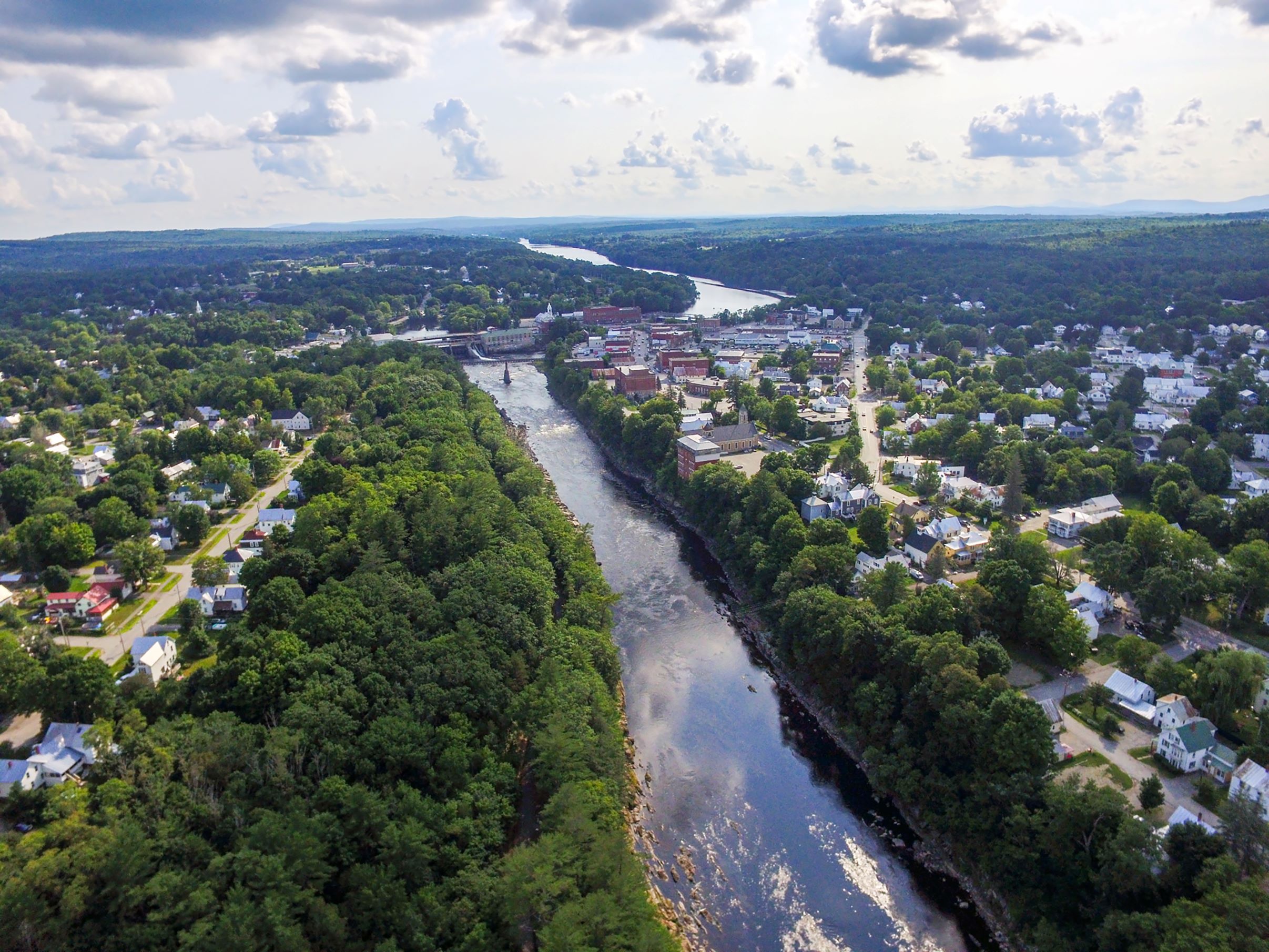
Aerial view of Skowhegan courtesy MXH Marketing
Skowhegan is a town with a vision, built on the same strengths that drew Indigenous people here thousands of years ago: woods, water, and hard work.
This year, as the town of Skowhegan marks its bicentennial, the natural resources that fueled a growing mill and factory town on the Kennebec River power a plan to reshape this Somerset County t own. Skowhegan’s 20-year dream of building Maine’s first whitewater river park has gained momentum with an infusion of funds to support riverfront development and river access for visitors and locals alike.
Today’s pioneers in Skowhegan have opened shops and revitalized the grain industry. They have restored the downtown’s stately brick buildings, paved the way for entrepreneurs, and drawn thousands from far and near to events that include Skijor Skowhegan, the Kneading Conference, and Craft Brew Festival.
While Skowhegan builds momentum to become an outdoor recreation mecca with food and drink to support it, MaineCF grants, staff expert ise, and strong donor funding have provided tools to help rejuvenate the downtown.
Skowhegan was one of three pilot communities chosen for MaineCF’s Community Entrepreneurship Program, managed in partnership with the National Main Street Center and Maine Downtown Center.
Kristina Cannon directs Main Street Skowhegan, a driving force behind many of the initiatives that are transforming this community of about 8,600 residents. For the past three years, grants from MaineCF have also supported the organization’s strategic planning, community conversations, and efforts toward the Skowhegan River Park.
“We are a special community and we do have so much potential – and we’ve got great resources and assets,” Cannon said. The key, she said, is “not trying to be something that we’re not. Looking to the future and making sure that we are a thriving community is something that’s been important as part of this journey.”
While other towns have sometimes banked on outside investments to rebuild commerce, Skowhegan is tapping both local talent and investors for its downtown revival.
Amber Lambke, one of the first, helped seed Skowhegan’s growth with Maine Grains. The gristmill business has drawn international attention for its role in reviving regional grain production. Ten years later, it continues to expand with a new downtown building in addition to its mills, café, and other businesses housed in the former county jail.
Matt DuBois, who like Lambke is on MaineCF’s board and a longtime Western Mountains Committee member, also invested in downtown with a bakery housed in an 1864 bank and a floral and formal wear shop next door. Since then, boutiques and a wine bar have added to the downtown’s draw and a distillery is on the horizon.
Skowhegan has launched a new center for innovation supported by MaineCF and donors that works with local startups, aspiring entrepreneurs, and existing businesses; plans include a commercial food hall and incubator kitchen. A $15 million redevelopment of the historic mill on Skowhegan’s downtown island will become a brewery, housing, and a hotel. And $2M in federal funding to Main Street Skowhegan will dramatically impact the downtown with a waterfront promenade and better access to the river.
Skowhegan is a model for other towns in the region that have faced major challenges with the loss of industrial jobs, persistent poverty, and declining populations, said John Ochira, a MaineCF program officer who oversees the Western Mountains Fund. “They are building resilience by focusing on their strengths.”
Main Street Skowhegan’s building is a case study for that strategy: A coffee shop – downtown’s only – will open on the first floor along with the gear library where residents can borrow recreational equipment to explore the river and nearby trails. The organization’s Skowhegan Outdoors AmeriCorps Program, started with a Western Mountains Fund grant, also provides outdoor activities, clinics , and outings for the community.
“We’ve just been doing a lot of bootstrapping and doing what we can to give people this sense of excitement for where Skowhegan is going,” said Cannon. “Then they want to get on board.”
Visitors can already enjoy portions of the future Skowhegan River Park: Several years ago, the town constructed the scenic Debe River Walk along the gorge in anticipation of the park.
Main Street Skowhegan plans to grow the trail network and has commissioned a trail master plan, supported by MaineCF, to map more than 50 miles of current and future trails. The pathways will be accessible from the commercial district for hiking, mountain biking, cross-country skiing, and snowshoeing. Preliminary site work for riverfront development could start as soon as the summer.
“The way the town, the business community, and nonprofit organizations have chosen to respond to these challenges is inspiring and promising,” Ochira said. “Donors want to support ideas that lead to long-term solutions and Skowhegan is putting those ideas to work.
Strong philanthropic support for Skowhegan and the surrounding region grew from the vision of MaineCF’s first board chair, H. King Cummings. Read more about his bequest that helped launch the Western Mountains Fund and fund $10 million in grants toward nonprofit initiatives in Maine.





